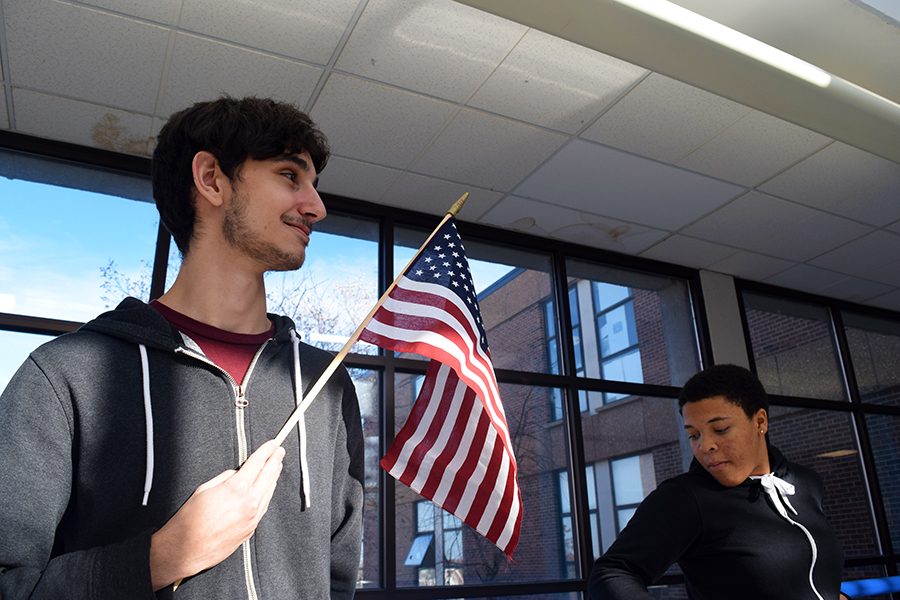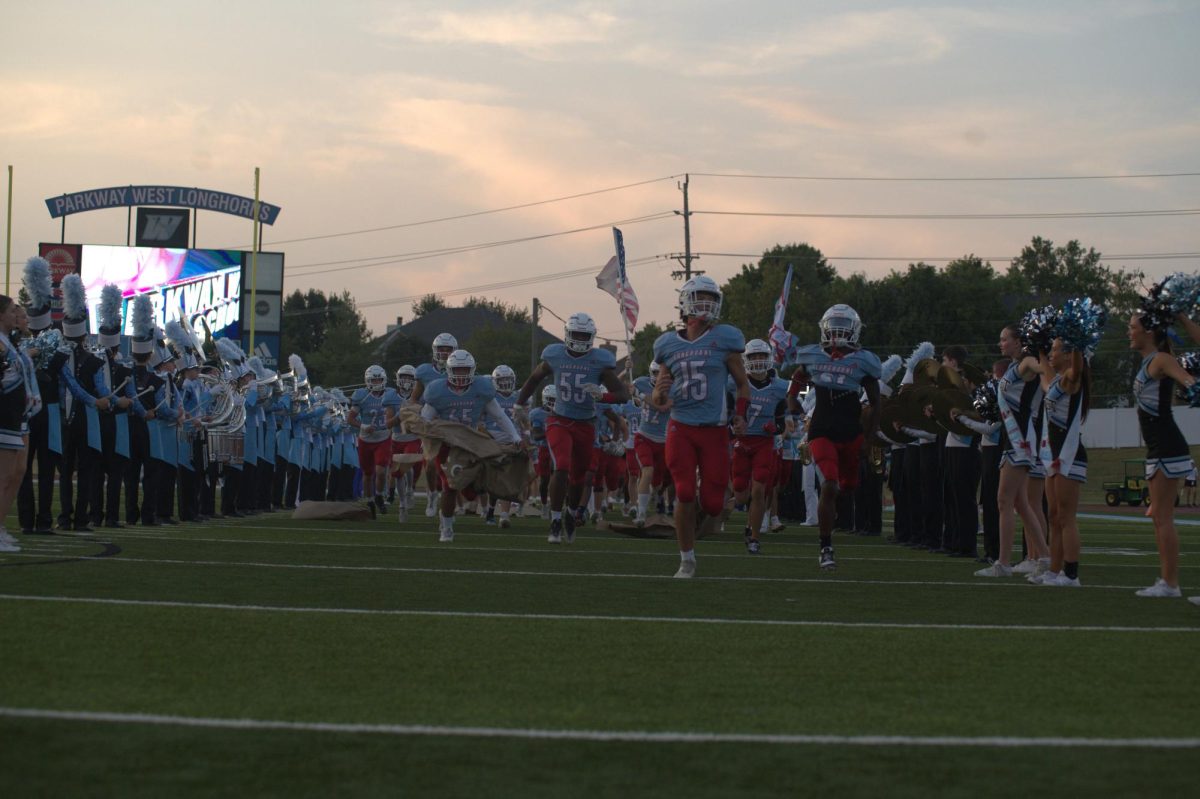“…One nation, indivisible, with liberty and justice for all.”
Not everyone agrees with this controversial last line of the Pledge of Allegiance, which echoes throughout the school daily.
“I sit during the Pledge because I don’t believe what it stands for. Why should I pledge my life and loyalty to this country that doesn’t do the same for me?” junior Gabi Thompson said, who is an active member of African American Student Acceleration Program (ASAP). “I feel like my people are persecuted in this country and always have been. I can’t love a country that has hated me since I was born. That sounds really dramatic, but it’s true.”
Students across the country took a seat during the Pledge after San Francisco 49ers quarterback Colin Kaepernick kneeled during the National Anthem to support people of color.
“I am not going to stand up to show pride in a flag for a country that oppresses black people and people of color,” Kaepernick said to the National Football League (NFL). “To me, this is bigger than football and it would be selfish on my part to look the other way. There are bodies in the street and people getting paid leave and getting away with murder.”

After the passing of House Bill 1750 on Feb. 16, the Pledge is required every day in public schools across Missouri. A recent Pathfinder survey found that only 35.9 percent of students like saying the Pledge daily, compared to last year when it was only said on Mondays.
“I felt comfortable with what I was saying but not the principle of it,” sophomore Natan Shpringman said, who started sitting during the Pledge a few years ago. “It felt like there wasn’t substance to it. What’s actually in the Pledge I agree with, but I don’t agree with having to rattle it off every day and stand up for it.”
The Missouri Representative who sponsored that bill, Shane Roden, wants to push another law requiring it to be stated in English.
“Next thing you know we’re reciting our Pledge of Allegiance in Arabic,” Roden said to CBS Local St. Louis. “The Pledge of Allegiance needs to be recited in the English language because that is the official language of Missouri.”
Over 80 percent of students believe that the Pledge does not have to be spoken in English. The same poll also found that 71.8 percent of students still stand during the Pledge, one being junior Sam Gaddis.
“I know that some people stay sitting due to the recent racial conflicts,” Gaddis said. “However, this makes no sense to me. People have fought for African Americans to have rights; stand for Abraham Lincoln, stand for Martin Luther King Jr.”
However, Thompson believes that taking a seat is a respectful act.

“My heart hurts whenever I think about the Pledge or the national anthem. I think about slaves getting thrown off of slave ships and sitting in those tight cramped spaces. Or black people getting beaten just because they sat at a whites only counter or drunk for a water fountain for whites. I think of Rosa Parks and Martin Luther King. I think of these great black people who stood up for what they believed in, and how wrong that it is that we still have to fight for our rights even today,” Thompson said. “I am ‘standing up’ like Rosa Parks did.”
Vickie Hankammer, the receptionist in the main office, leads the school in the Pledge daily. Both of her parents and her grandparents served in the military.
“I think about it every time [I say it] and I try not to get emotional,” Hankammer said. “I think you’re not just honoring the Pledge of Allegiance; you’re honoring the sacrifice of lives that went into making this country free 200 years ago.”
Principal Jeremy Mitchell, whose father served in Vietnam, believes sitting or kneeling during the Pledge or national anthem sends an offensive message to those who have served.
“I respect everyone’s opinion, and I respect the fact people don’t want to, [they would rather] sit and not stand, but my argument would be that there is a much better way of doing it by not possibly offending those around them who they have no intent to offend,” Mitchell said.
Mitchell suggests students who feel passionately about the Pledge should email representative Roden.
“Use that time, use that energy, use that place to email legislator [Shane Roden],” Mitchell said. “Say that by accepting all people, all Americans, regardless of race, color, sexual preference—you name it—by us all coming together and having a conversation [is better than] us all reciting a pledge that somehow you think will make us all more patriotic.”



![Gazing up from the stage, junior Joseph McCurdy who played Peter Pan in the school play, Lost Girl, sits next to senior Juliana Rogers, who plays Wendy Darling, during a theater rehearsal. McCurdy’s passion for theater began when he observed a West High production in middle school. “I've been in the high school theater program since I was a freshman. I've always loved theater, but [what prompted me to join] was [when] I went to see [a performance here] when I was in middle school, and it was super cool,” McCurdy said.](https://pwestpathfinder.com/wp-content/uploads/2025/11/IMG_6535-1200x798.jpeg)

![Standing tall, stacked in a precise formation, the cheer team strikes a signature pose during halftime on Sept. 12 at the varsity football game. Nearly a month after this performance, the cheer team performed at the Missouri Cheerleading Coaches Association (MCCA) regional competition on Oct. 4, 2025. “We've all come [to] work together a lot more,” sophomore Elyssa Philippi said. “We're a lot closer than we were [earlier in the season] and going to state has made us closer [in] trying to work with each other, learn [new] skills and make our team better.”](https://pwestpathfinder.com/wp-content/uploads/2025/11/DSC5139-1.jpg)
![Handing out candy to excited trunk-or-treaters, President of the United Nations Children’s Fund club and junior Sara Ashok represents that group. Ashok was eager to participate in this event for multiple reasons. “I really wanted to be a part of the event because I get to help create memories for kids and spend time with my friends, spreading the things [I'm passionate about],” Ashok said.](https://pwestpathfinder.com/wp-content/uploads/2025/11/DSC_8648-1-1200x800.jpg)

![Smiling in a sea of Longhorns, Fox 2 reporter Ty Hawkins joins junior Darren Young during the morning Oct. 3 pep rally. The last time West was featured in this segment was 2011. “[I hope people see this and think] if you come to [Parkway] West, you will have the time of your life because there are so many fun activities to do that make it feel like you belong here. I was surprised so many people attended, but it was a lot of fun,” Young said.](https://pwestpathfinder.com/wp-content/uploads/2025/10/Edited2-1200x798.jpg)
![West High seniors and families listen as a representative of The Scholarship Foundation of St. Louis, Teresa Steinkamp, leads a Free Application for Federal Student Aid (FAFSA) workshop. This session, held in the library, provided guidance on financial aid, scholarships and student loan options. “This event is very beneficial for any seniors who are applying to or considering applying to colleges after high school [because] the cost of college is on the rise for seniors and parents,” college and career counselor Chris Lorenz said.](https://pwestpathfinder.com/wp-content/uploads/2025/09/DSC_4478-1200x778.jpg)
![Senior Kamori Berry walks across the field during halftime at the Homecoming football game on Sept. 12. During the pep assembly earlier that day, she was pronounced Homecoming Queen. “I thought it was nice that the crowd [started] cheering right away. I know [my friends] were really excited for me, and my family was happy because typically non-white people don't win,” Berry said.](https://pwestpathfinder.com/wp-content/uploads/2025/09/DSC7046-Enhanced-NR-1200x798.jpg)



![Sophomore Shree Sikkal Kumar serves the ball across the court in a match against Lindbergh. Sikkal Kumar has been a varsity member of the varsity girls’ tennis team for two years, helping her earn the number two rank in Class 2 District 2.“When matches are close, it’s easy to get nervous, but I [ground] myself by[staying] confident and ready to play,” Sikkal Kumar said.](https://pwestpathfinder.com/wp-content/uploads/2025/11/DSC2801-1200x798.jpg)
![Dressed up as the varsity girls’ tennis coach Katelyn Arenos, senior Kate Johnson and junior Mireya David hand out candy at West High’s annual trunk or treat event. This year, the trunk or treat was moved inside as a result of adverse weather. “As a senior, I care less about Halloween now. Teachers will bring their kids and families [to West’s Trunk or Treat], but there were fewer [this year] because they just thought it was canceled [due to the] rain. [With] Halloween, I think you care less the older you get,” Johnson said.](https://pwestpathfinder.com/wp-content/uploads/2025/10/DSC00892-1-1200x800.jpg)
![Focused on providing exceptional service, sophomore Darsh Mahapatra carefully cleans the door of a customer’s car. Mahapatra has always believed his customers deserve nothing less than the best. “[If] they’re trusting us with their car and our service, then I am convinced that they deserve our 100 percent effort and beyond,” Mahapatra said.](https://pwestpathfinder.com/wp-content/uploads/2025/10/DSC_0018-1200x800.jpg)
![Sophomore Aleix Pi de Cabanyes Navarro (left) finishes up a soccer game while junior Ava Muench (right) warms up for cross country practice. The two came to Parkway West High School as exchange students for the 2025-2026 school year. “The goal for the [exchange] program is to provide opportunities for both Parkway students and our international exchange students to learn about other cultures, build connections and become confident, capable, curious and caring — Parkway’s Four C’s — in the process,” Exchange Program Lead Lauren Farrelly said.](https://pwestpathfinder.com/wp-content/uploads/2025/10/Feature-Photo-1200x800.png)
![Leaning on the podium, superintendent Melissa Schneider speaks to Parkway journalism students during a press conference. Schneider joined Parkway in July after working in the Thompson School District in Colorado. “My plan [to bond with students] is to get things on my calendar as much as possible. For example, being in [classes] is very special to me. I am trying to be opportunistic [meeting] kids [and] being in [the school] buildings. I have all the sports schedules and the fine arts schedules on my calendar, so that when I'm available, I can get to them,” Schneider said.](https://pwestpathfinder.com/wp-content/uploads/2025/09/IMG_5425-1200x943.jpeg)
![Gazing across the stage, sophomore Alexis Monteleone performs in the school theater. The Monteleone family’s band “Monte and the Machine” has been releasing music since 2012, but Alexis started her own solo career in 2024 with the release of her first single, Crying Skies. “My whole family is very musical, [and I especially] love writing [songs with them],” Monteleone said.](https://pwestpathfinder.com/wp-content/uploads/2025/09/DSC7463-1200x798.jpg)
![Leaping through the air, senior Tyler Watts celebrates his first goal of the season, which put the Longhorns up 1-0 against the Lafayette Lancers. Watts decided to play soccer for West for his last year of high school and secured a spot on the varsity roster. “[Playing soccer for West] is something I had always dreamed of, but hadn’t really had a good opportunity to do until now. It’s [really] fun being out [on the field], and I’m glad I decided to join the team. It’s just all about having fun with the boys and enjoying what time we have left together,” Watts said.](https://pwestpathfinder.com/wp-content/uploads/2025/09/DSC_1951-1200x855.jpg)

![Shifting global trade, President Donald Trump’s tariffs are raising concerns about economic stability for the U.S. and other countries alike. “[The tariffs are] going to pose a distinct challenge to the U.S. economy and a challenge to the global economy on the whole because it's going to greatly upset who trades with who and where resources and products are going to come from,” social studies teacher Melvin Trotier said.](https://pwestpathfinder.com/wp-content/uploads/2025/05/MDB_3456-1200x800.jpg)
